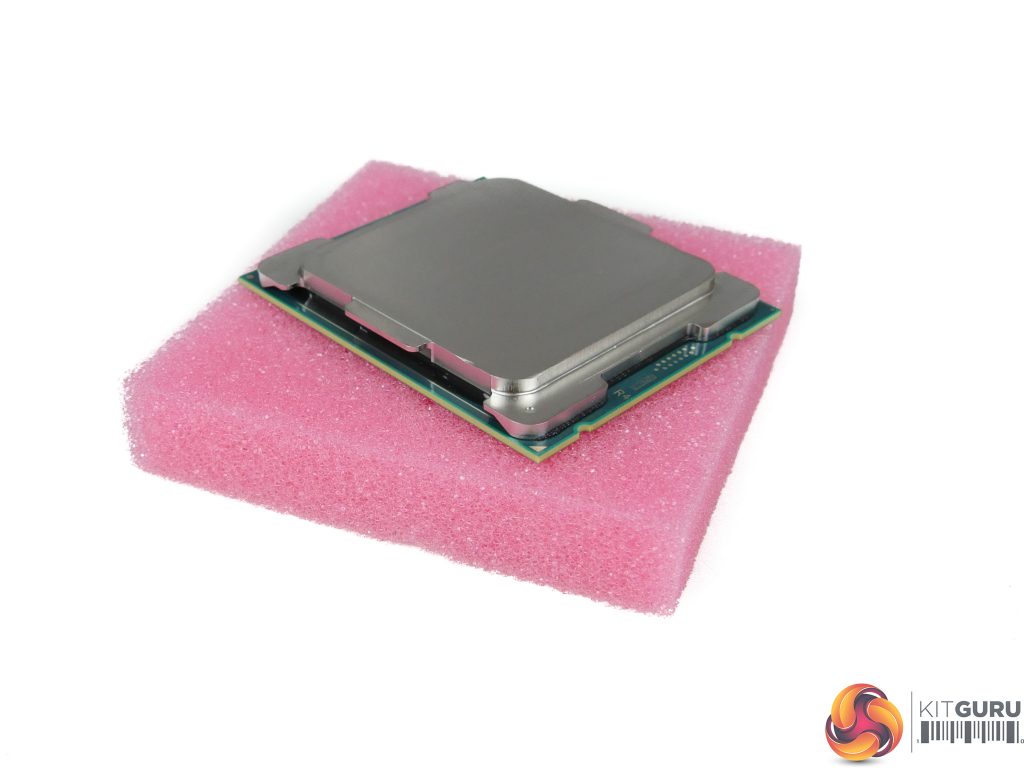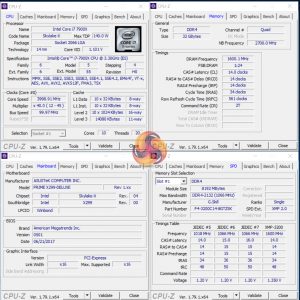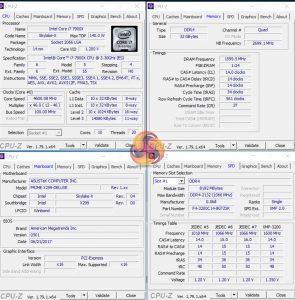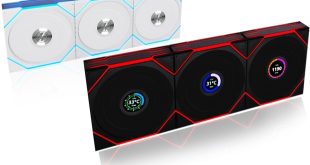We will be outlining the Core i9-7900X CPU's performance while using an ASUS X299-Deluxe LGA 2066 motherboard. A 32GB (4x8GB) kit of G.Skill's Trident Z 3200MHz CL14 DDR4 memory serves our test system.
Today's comparison processors come in the form of:
- Broadwell-E i7-6800K (6C12T) and i7-6950X (10C20T).
- Kaby Lake's i7-7700K (4C8T).
- Ryzen 7's 1800X (8C16T).
Each processor is tested at its default out-of-the-box settings and when overclocked to a reasonable level. For the Intel CPUs, we ensured that forced-turbo was disabled so that Intel's defined Turbo Boost parameters were functioning correctly. As such, all-core load frequencies for the tested chips are as follows:
- Core i9-7900X = 4.0GHz (most of the time, with Handbrake or synthetic stress tests as an exception).
- Core i7-6950X = 3.4GHz (most of the time, with Handbrake or synthetic stress tests as an exception).
- Core i7-6800K = 3.5GHz.
- Core i7-7700K = 4.4GHz.
- Ryzen 7 1800X = 3.7GHz.
CPU Test System Common Components:
- Graphics Card: Nvidia GeForce GTX 1080 Ti Founders Edition (custom fan curve to eliminate thermal throttling).
- CPU Cooler: Noctua NH-D15 & Corsair H110i GT.
- Games SSD: SK hynix SE3010 SATA 6Gbps 960GB.
- Power Supply: Seasonic Platinum 760W.
- Operating System: Windows 10 Pro 64-bit (Creators Edition).
Skylake-X LGA 2066 System (i9-7900X):
- 7900X CPU: Intel Core i9 7900X ‘Skylake-X' (ES) 10 cores, 20 threads (4.6GHz @ 1.20V overclocked).
- Motherboard: ASUS X299-Deluxe (LGA 2066, X299).
- Memory: 32GB (4x8GB) G.Skill Trident Z 3200MHz 14-14-14-34 DDR4 @ 1.35V.
- System Drive: Samsung 840 500GB.
Ryzen AM4 System (Ryzen 7 1800X):
- 1800X CPU: AMD Ryzen 7 1800X ‘Summit Ridge' 8 cores, 16 threads (4.05GHz @ 1.425V overclocked).
- Motherboard: Gigabyte Aorus AX370-Gaming 5 & ASUS Crosshair VI Hero (AM4, X370, AGESA 1006).
- Memory: 16GB (2x8GB) G.Skill FlareX 3200MHz 14-14-14-34 DDR4 @ 1.35V.
- System Drive: SanDisk Ultra Plus 256GB.
Kaby Lake LGA 1151 System (i7-7700K):
- 7700K CPU: Intel Core i7-7700K ‘Kaby Lake' (Retail) 4 cores, 8 threads (4.8GHz @ 1.35V overclocked).
- Motherboard: ASUS Maximus VIII Hero (LGA 1151, Z170).
- Memory: 16GB (2x8GB) G.Skill FlareX 3200MHz 14-14-14-34 DDR4 @ 1.35V.
- System Drive: Micron M600 256GB.
Broadwell-E LGA 2011-3 System (i7-6800K, i7-6950X):
- 6800K CPU: Intel Core i7 6800K ‘Broadwell-E' (Retail) 6 cores, 12 threads (4.2GHz @ 1.275V overclocked).
- 6950X CPU: Intel Core i7 6950X ‘Broadwell-E' (Retail) 10 cores, 20 threads (4.2GHz @ 1.275V overclocked).
- Motherboard: ASUS ROG Strix X99 Gaming (LGA 2011-v3, X99).
- Memory: 32GB (4x8GB) G.Skill Trident Z 3200MHz 14-14-14-34 DDR4 @ 1.35V (at 3000MHz for the 6800K due to IMC weakness).
- System Drive: SanDisk Ultra Plus 256GB.
Software:
- ASUS X299-Deluxe BIOS v0501 (pre-release).
- GeForce 382.33 VGA drivers.
Tests:
Productivity-related:
- Cinebench R15 – All-core & single-core CPU benchmark (CPU)
- HandBrake – Convert 6.27GB 4K video recording using the Normal Profile setting and MP4 container (CPU)
- Mozilla Kraken – Browser-based JavaScript benchmark (CPU)
- x265 Benchmark – 1080p H.265/HEVC encoding benchmark (CPU)
- 7-Zip – Built-in 7-Zip benchmark test (CPU & Memory)
- SiSoft Sandra – Memory bandwidth (Memory)
Gaming-related:
- 3DMark Time Spy – Time Spy (DX12) test (Gaming)
- Ashes of the Singularity Escalation – Built-in benchmark tool CPU-Focused test, 1920 x 1080, Extreme quality preset, DX12 version (Gaming)
- Ghost Recon: Wildlands – Built-in benchmark tool, 1920 x 1080, Very High quality preset, DX12 (Gaming)
- Grand Theft Auto V – Built-in benchmark tool, 1920 x 1080, Maximum quality settings, Maximum Advanced Graphics, DX11 (Gaming)
- Metro: Last Light Redux – Built-in benchmark tool, 1920 x 1080, Very High quality settings, SSAA Enabled, AF 16X, High Tessellation, DX11 (Gaming)
- Total War Warhammer – Built-in benchmark tool, 1920 x 1080, Ultra quality preset, DX12 version (Gaming)
 KitGuru KitGuru.net – Tech News | Hardware News | Hardware Reviews | IOS | Mobile | Gaming | Graphics Cards
KitGuru KitGuru.net – Tech News | Hardware News | Hardware Reviews | IOS | Mobile | Gaming | Graphics Cards






Good review . Honestly even if Intel gets all the goodness of being a fast processor its highly priced. Also poor thermal performance is a big deal because processor eventually runs hot and performance will take a toll.
I am personally waiting for Threadripper AMD’s line up to compete with Intel’s half cooked CPU.If AMD TH has good price and good thermal efficiency then even if it is a bit slower then Intel’s offering people will go for it. Ryzen 7 and especially Ryzen 5 1600 cpu proved this already
What about VRM temperatures? 🙂
This is a review of the CPU. The VRM temps are going to vary depending on the board and its overly extravagant but largely useless cooling shroud.
Brilliant and thorough review, thank you very much.
I’d be happy with quad memory-channel i7-7740X with 44 PCI-e lanes. Fast enough for _everything_ I need, and would have enough memory and PCI-express bandwidth for the workloads I run (don’t need 10c/20t).
Unfortunately, it doesn’t exist. Either I have to buy the crippled i7-7740x with 28 PCIe and dual channel memory OR I have to buy the over-priced space heater that is the 7900X with a motherboard that fries eggs with the VRMs and sucks so much electricity out of the socket that I can hear the kill-o-watt whirr like crazy in the background while notes keep flying out of my wallet.
No thanks Intel. You really outdid yourself this time around.
I will wait for the ThreadRipper from AMD.
I like your test, but let me make a small correction, 7900X is faster then Ryzen only because of more cores and higher clock, not due to “modern architecture” (which while newer? then Ryzen is by no means better). But to count my chickens 🙂 Ryzen_OC is 4.05Ghz, 7900X_OC is 4.6Ghz
1776*1.25(because Intel has 25% more cores then AMD)=2220
now to equalize core speeds: 2220*4.6/4.05=2521 (the Ryzen score as it would be at 4.6Ghz) – IPC wise Intel (scored 2449) is still a bit worse then AMD in Cinebench.
I’m not saying that AMD is better since it can’t at the moment reach 4.6Ghz nor does it have 10 core CPU to fight with.
Similar thing happens with x265 encoding benchmark: 30,6*1,25*4,6/4,05=43,4444444 – a bit faster then Intel. And it is all in tasks that put use to AVX2 and there is still Intel advantage in 4 channel memory.
Well, at least you can wait a bit and see if Threadripper is actually better then Intel – there is no guarantee it is. Especially for lightly threaded tasks that you speak of (that per chance require high core clock that will most likely not be reachable on TR).
AMDs single core IPC is slightly worse than Intels, but AMDs implementation of SMT vs Intels HT brings it out on top by a slight margin at the same core/clocks in multi threaded benchmarks while losing in the single core benches. And then AMD doesn’t really OC well, neither does memory clock up well, its improving of course but not at any great pace.
Bottom line w/ Ryzen is mem clocks pf 2933 are a no brainer, and known to work 3200 components are common.
Thats the consensus on the street.
A pact with the devil will always bite u in the ass.
How can u trust intel?
Buy a $999 cpu w/ scads of lanes, & discover there is an charge to use nvmeS as they should be. Slimy.
The new keying system shows they use their research dollars to effect better ways of screwing customers. A good look guys.
I would buy amd gear if same money and 10% worse. My time, upgradeability, conscience and dignity are worth something too, thanks intel.
AMD probably are 10% worse in the criteria intel like to use, but AMDs modular/fabric architecture, is miles better than intel has or will have achitecture, for future cost effective ~equivalent outcomes.
BTW the prices u list for amd dont reflect reality. Both are much cheaper on amazon etc. Further, the widely regarded sweet spot is the 12 thread r5 1600, at ~$220
Lanes are just sufficient on ryzen, for a 16 lane gpu, a 4 lane nvme ssd onboard and a 4 lane pcie2 nvme ssd (~1.6GBps, or triple a sata ssd).. Beyond that, u have stacks of sata and .5GBps pcie2 expandability, but no 1GBps pcie3 lanes
note also, amd pcie3 lanes are direct to the cpu, not via switches and bridges like most intels.
Newsflash, the i7-7740X only has 16 PCIe Lanes, not 28!
Test w/ agesa 1006 please…..
Not sure why you would complain about a crippled quad core and decide to wait for a 10 core minimum threadripper lol. Amd has some amazing stuff coming out, but it will not have the IPC of intel.
The 8 core intel is actually a pretty sweet chip. It can overclock 2 of its best cores to 4.5 ghz for single or two thread tasks and 4.3 turbo on all cores. The thermal is only an issue when overclocking and when you get this many cores it will always be a problem when overclocking. Amd hasnt been able to go over 4.1 ghz yet.
Intel PCIE lanes are direct to the cpu as well. And if intel says a cpu has 16 lanes (like the 7700k) then those are dedicated to the GPU. The rest, in that case, come from the chipset via dmi 3. This is unlike AMD who is currently *overstating* PCIE lanes available for video. Sorry to burst your fanboy delusion bubble
I strongly suspect nothing you do requires 44 PCIE lanes or quad channel RAM. People complaining
about 7900x, and somehow not satisfied with *either* Kaby Lake *or* Ryzen 5/7, and obsessing instead over “Thread Ripper” sound generally clueless.
AMDs marketing is really working for TR. Somehow every hump on comment threads is now convinced they’re doing all sorts of things that somehow justify *32 threads*, even at lower IPC, and *dozens* of PCIE lanes and *mountains* of memory bandwidth. Enormously unlikely.
You can’t run a 32GB kit @3200Mhz on Threadripper cpu, it just fails to boot. Worst memory controller ever on a cpu i guess. It maxes out @ around 2800Mhz if you install 32gb of ram. If you go higher like 64gb, then you end up with 2133Mhz ddr4 speeds or 2400 if you are lucky.
Whereas I am running 64GB 3800Mhz CL15 kit with my 4.8Ghz 7900X. Unleashes my 2x overclocked Titan Xps in SLI. AMD doesn’t clock well, has the worst memory support and has lower IPC and thus lower gaming performance. It’s just good for rendering & encoding farms.